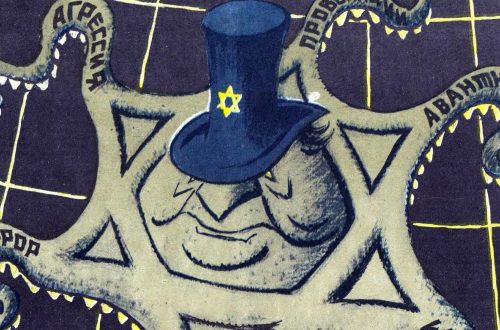This is a cross-post by Mark Gardner from the CST blog
Gilad Atzmon is an ex-Israeli Jew. His latest book, “The Wandering Who?”, is potentially a key moment in the battle against contemporary antisemitism: forcing parts of the anti-Zionist left to finally confront the antisemitic dead-end that their over-heated fervour can lead to.
The book is both old and new. Its content is mainly edited and compiled from Atzmon’s blog polemics over the years. Its theory takes the French Revolution’s maxim “To the Jew as an individual, everything! To the Jews as a people, nothing!” and fuses it with utterly contemporary cultural racism. It is an anti-Jewish variant of the ascendant trend to trash other peoples’ cultures and supposed / alleged group mentalities. If anti-racists support this book, then Jews are facing (even) more exceptional hostilities than previously imagined.
Usually, this cultural racism comes from new far right and nationalist groups, who disavow actual Nazism and genetic race theory. Atzmon sits on the left not the right, yet he and Hitler still share the same favourite Jew: Otto Weininger, who philosophised on “the notion of genius”, but hated Jews and his Jewishness so much that he killed himself. Atzmon’s book admits Weininger “was an antisemite” and is not uncritical of some of his writing, but he also states
There is a personal side to my admiration: Weininger helped me grasp who I am, or rather who I may be, what I do, what I try to achieve and why my detractors invest so much effort trying to stop me
This is pure Atzmon. He ought to have simply written on the cover, ‘look at me, I’m a naughty genius: a truth-teller the likes of which you have never seen. I will drive you to distraction and destruction.’
There is no brilliance in Atzmon’s book (or perhaps more accurately, in his blog writings). His construct of “Jewish Identity Politics” is staggeringly partial and therefore plain wrong. Neither is it entirely new ground, evoking any number of Jewish history and identity twisters, including American far right theoretician, Kevin MacDonald, author of A People That Shall Dwell Alone: Judaism as a Group Evolutionary Strategy (1994); Separation and its Discontents: Toward an Evolutionary Theory of Anti-Semitism (1998); and The Culture of Critique: An Evolutionary Analysis of Jewish Involvement in Twentieth-Century Intellectual and Political Movements (1998).
Atzmon does not indulge in yesterday’s conspiracy theories. (p 169 “there is no such thing as ‘Jewish conspiracy’. Everything is in the open”.) Instead, he has something far more insidious up his sleeve: a conspiracy without a head, a conspiracy that just is. He calls it an “organismus”: German for organism. Unlike most of the book, “organismus” does not seem to have previously appeared on Atzmon’s blog. Why is he resorting to German at this precise moment? To make it sound more scientific? To make it sound more sinister?
(p.21)…It is more than likely that ‘Jews’ do not have a centre or headquarters. It is more than likely that they aren’t aware of their particular role within the entire system, the way an organ is not aware of its role within the complexity of an organism…
…Looking at Zionism as an organismus [Atzmon’s emphasis] would lead to a major shift in our perception of world affairs…
(p.88)…Zionism is a global network with no head, it is a spirit – spirit, unfortunately, cannot be defeated. Yet, it must be exposed for what it is.
There are those within anti-Zionist circles (importantly including some leading Jewish anti-Zionists and, belatedly, the Socialist Workers Party) who warn that Atzmon is a thoroughly dangerous driver; and they have tried distancing themselves and their movement from him. Such opposition is sincere, but demands self-reflection upon their own fervid demonising of mainstream Jewish sensibilities; and the foundational role that has played in helping to legitimise this dreadful book within parts of their own movement.
Atzmon bastardises the meaning of Zionism, subordinating it to his “Jewish Identity Politics” leitmotif; and thereby captures (indeed, often prioritises) Jewish anti-Zionists within his contempt, writing
(p.19) Zionism is not a colonial movement with an interest in Palestine…Zionism is actually a global movement…To be a Zionist means to accept that, more than anything else, one is primarily a Jew.
This being “primarily a Jew” is what Atzmon terms as “3rd category Jews”. These are the Bad Jews
(p.16) those who call themselves Jews could be divided into three main categories:
1. Those who follow Judaism.
2. Those who regard themselves as human beings that happen to be of Jewish origin.
3. Those who put their Jewish-ness over and above all other traits.
The first two categories may denote a harmless and innocent group of people.
Atzmon’s blog features much of this, dated 2009, when he said “obviously the first two categories specify an harmless group of people”. We cannot be sure why he has had second thoughts about the innocence of such Jews, changing “obviously…harmless” to the more circumspect “may denote a harmless and innocent group”.
The book ends with snide and deeply revealing thanks to those Jewish anti-Zionists who helped Atzmon to realise the true extent of his (supposed) rationale
I cannot let this opportunity pass without thanking from the bottom of my heart my half the dozen [sic] Jewish Marxist detractors who have been stalking me and my music career day and night for year, without whom I would never have grasped the real depth of tribal ferocity. It is these so called ‘anti Zionist’ Jewish ethnic activists who taught me more than any rabid Zionist about the true devastating practical meaning of Jewish identity politics.
These (other than the endnote references) are the last words of Atzmon’s book. They summarise it all. Yes, he hates Israel. Yes, he hates Zionism. Yes, he proudly hates himself: but its all about “Jewish identity politics”, by which he means primarily self-defining as a Jew. Indeed, the book’s sub-title tells us this, “A Study of Jewish Identity Politics”.
The notion that a book that explicitly and consistently attacks (what it invents and then defines as) “Jewish Identity Politics” is not antisemitic beggars the question as to what, other than Nazi race theory and gas chambers, does actually qualify as being antisemitic. It is like Caryl Churchill’s “Seven Jewish Children” play all over again: when I say Jewish, I do not mean Jews and anyone who says otherwise exposes themselves as a pro-Israel smear merchant.
As with “Seven Jewish Children”, the tell-tale clue lies in the title, stupid. Here, it’s “The Wandering Who?”, a pointed take on The Wandering Jew; a medieval antisemitic fantasy figure (sometimes called The Eternal Jew) whose outcast status matched the condition of Jews until modern times. (The myth relates how the Jew supposedly mocked Jesus prior to his crucifixion, and so was condemned to wander the earth until Jesus returned.)
As a perverse witticism, “The Wandering Who?” does not match David Irving’s take on the Holocaust denying Leuchter Report: showing the tracks at Auschwitz-Birkenau with the caption, “Auschwitz: the end of the line”. Nevertheless, it resides within the same cold joke category and opponents of antisemitism should reject it before they even open the cod-psychology garbage that lies within.
Those who stick it out as far as page 120 will reach Chapter 15, entitled “Swindler’s List”, another cold joke (and one separately employed by Holocaust denier, Ernst Zundel): but Atzmon’s callous sneer at the Jewish Holocaust experience really manifests from pages 148-165, in what is primarily a repeat of his March 2007 article for Counterpunch, “From Esther to AIPAC”. This sums it up
(p.153) From this point onward, I shall maintain that the Holocaust religion was well established a long time before the Final Solution (1942), well before Kristallnacht (1938), the Nuremberg Laws (1936) and even before Hitler was born (1889). The Holocaust religion is probably as old as the Jews themselves.
CST has consistently warned about the antisemitic route down which some anti-Zionists have careered these last few years. This book shows exactly where they have ended up. Support for this book, while perhaps in a minority amongst anti-Zionists, reveals the shocking extent to which, for some anti-Zionists, their struggle has gone from focusing upon Palestinian rights to focusing upon Jews.
Why do Jews behave as they (allegedly) do? What is it about these Jews? What is Jewishness all about? And…how do we fight this poisonous presence? In summary, they are formulating what risks becoming the new Jewish Question.


